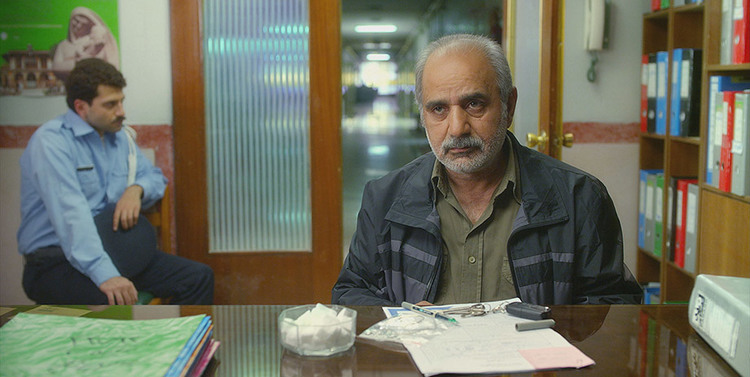Foreign Oscar Watch: Iran's "Today"
 Tuesday, November 18, 2014 at 9:37AM
Tuesday, November 18, 2014 at 9:37AM [This post is part of our continuing series on this year’s contenders for the Best Foreign Language Film Oscar. We're aiming to review (gasp) half of them. Here’s Amir with the Iranian entry, Today. He has also interviewed the director and discussed the film on his Iranian cinema podcast "Hello Cinema". - Editor]
 Reza Mirkarimi is probably overdue for an Oscar nomination. Sure, his name doesn’t ring a bell for a lot of cinephiles and doesn’t carry the same weight as internationally renowned Iranian auteurs such as Kiarostami, Panahi or Asghar Farhadi, but consider this: He is the only filmmaker to have had his films shunned by both the Academy and the Iranian committee that submits them!
Reza Mirkarimi is probably overdue for an Oscar nomination. Sure, his name doesn’t ring a bell for a lot of cinephiles and doesn’t carry the same weight as internationally renowned Iranian auteurs such as Kiarostami, Panahi or Asghar Farhadi, but consider this: He is the only filmmaker to have had his films shunned by both the Academy and the Iranian committee that submits them!
His first try for gold came back in 2005 with So Close, So Far, a meditative and moving portrayal of a broken father-son relationship. It was far stronger than all five of the eventual nominees but that was before voters in this category had begun to vote for what is actually best. Still, he had every reason to be hopeful in 2012 with A Cube of Sugar, a distinctly Iranian film with a regional flavor that surprisingly won awards at every festival it played at. Coming on the back of A Separation’s win, it was reasonable to expect the raised profile of Iranian cinema to help the film along the finish line. Yet, the Iranian committee submitted the film and boycotted the Oscars later on the same day! Remember that strange story?
So, two years on, Mirkarimi is back with Today, a consensus option that wasn’t exceptionally well received in its home country, but saved the committee a whole lot of political trouble compared to their other choices...

Perhaps, there was an element of a favor owed to one of the country’s most consistent filmmakers after that last faux pas, too.
In Today, the great actor Parviz Parastuyi stars as Younes, a taciturn taxi driver who comes across an injured, pregnant woman and drives her to the hospital. Because her situation is suspicious, the hospital staff asks for a male guardian – an unfortunate but not unusual request under Islamic law – to authorize her procedures. Younes quietly agrees to fill the first form, and then another, and then another, and then he spends the entire day and night with her at the hospital.
Several of Mirkarimi’s films feature a central character who rarely speaks. His plots usually progress through the actions of those around the protagonist. As Younes rarely talks, his motivations for supporting this woman remain unclear and the hospital staff keep guessing and become increasingly confrontational. Is he her father, or an abusive husband who beat her? Is she a sex worker and he her client? The staff doesn’t know he’s only a driver but even the audience, aware of that fact, can’t make any guesses about the motivations, hence opening the film to allegorical interpretations. Is the limping Younes a stand-in for a post-war generation of Iranians struggling to revitalize the country? Is the hospital Mirkarimi’s bitter view of modern Iran and the woman’s baby a grim view of the future?
Whether one reads the film as a straightforward story about one man’s mysterious connection to a strange, sympathetic woman, or a grand allegory about modern Iranian society, the slow-burn narrative and the emotional payoff of the film’s subtle final reveal are incredibly effective. Parastuyi’s performance is a marvel, communicating a world of pent-up feelings with his quiet gazes. Mirkarimi’s characteristically graceful storytelling immerses the audience in a story that, even at its coyest moments, remains intriguing. Today challenges the meaning of virtue and guilt in a country where spirituality is defined and enforced within a very limited, religious scope.
Is the film good enough for a nomination? Qualitatively, yes, but in a year with so many high profile contenders, it’s likely that it will fall off the radar. Mirkarimi will surely be back again.
28 of 83 Foreign Submissions Reviewed: Afghanistan, Argentina, Australia, Belgium, Brazil, Canada, Cuba, Czech Republic, Finland, France, Georgia, Germany, Hungary, Iceland, Israel, Iran, Italy, Latvia, Mauritania, Norway, Panama, Poland, Portugal, Sweden, Switzerland,
Turkey, Uruguay, and Venezuela. Complete Oscar Charts Here.



Reader Comments (2)
Amir, I really appreciate your reviews but you keep bringing up all these interesting-sounding Iranian filmmakers that I've never heard of, and it makes me panic. How many potentially great directors am I missing out on? Also how many potentially great directors don't make it out of festival limbo? Or even *into* festival limbo. Increasingly it seems like if a foreign film doesn't make it into the Cannes, Venice or at the very least Berlinale slate, it basically just doesn't exist.
goran- That's true of a lot of national cinemas unfortunately. In the past few years, I've found that the deeper I look into the programs of "smaller" festivals like Locarno, Karlovy Vary, San Sebastian, or Rotterdam, the more satisfied I am with the gems that I find. Even among the big three, the relatively low-key Berlin has the best films.
With the exception of Certified Copy, all my favorite films of the decade so far (Tabu, Neighboring Sounds, Museum Hours, The Strange Little Cat) premiered at one of the above mentioned festivals.